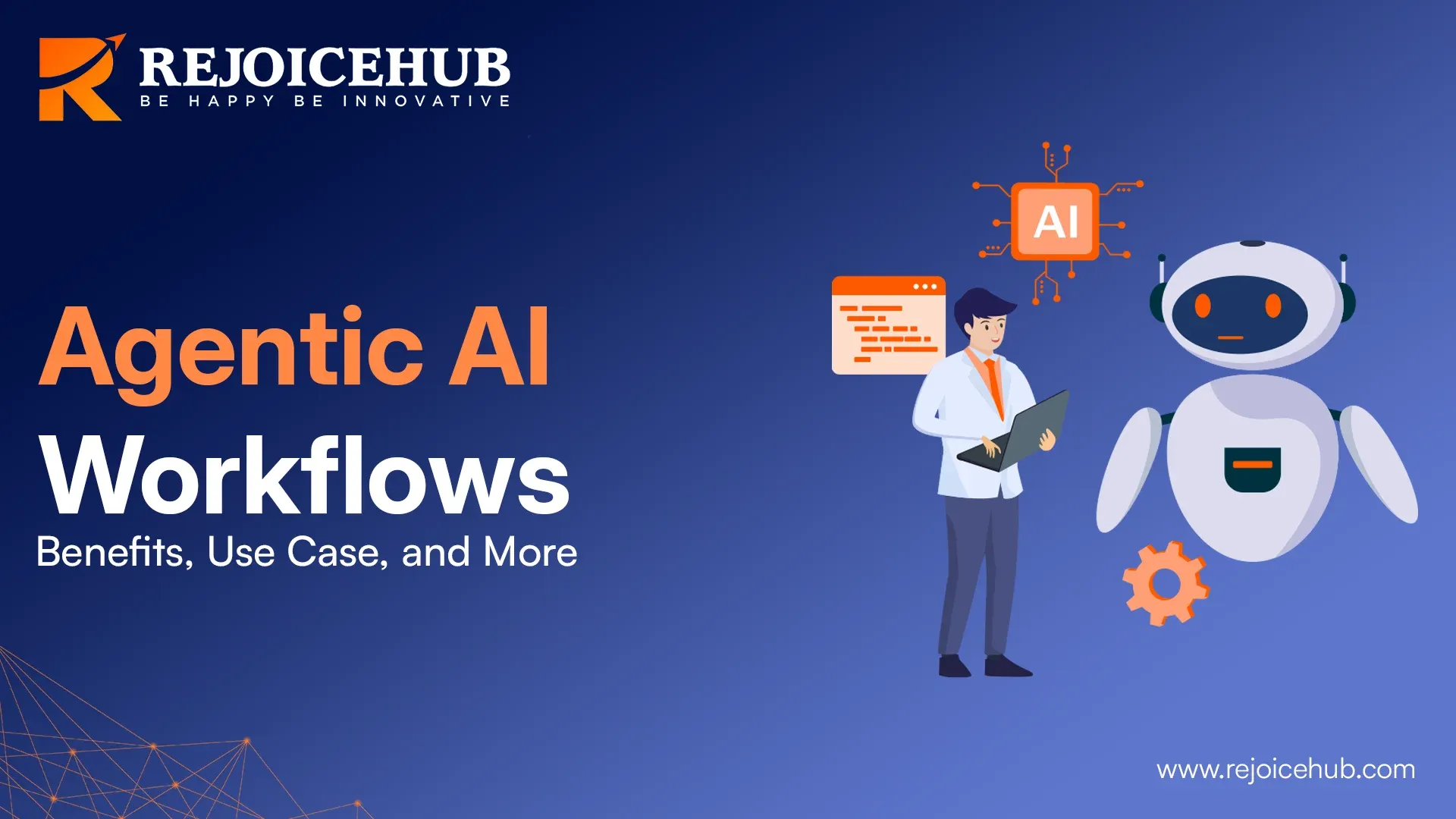
Think of agentic workflows as AI teams that actually get things done. These smart systems don't just follow commands – they take initiative. By bringing together multiple AI agents that work collaboratively with minimal babysitting, they're changing how businesses operate. They understand what you need, make smart decisions, and take action across your digital landscape – without constantly running back to humans for approval.
Quick Summary
What are agentic workflows? Picture a team of AI specialists that work together to solve problems. Unlike old-school automation that blindly follows rules, these digital teammates can think on their feet, adapt when surprises pop up, and figure out creative solutions. They're like having digital employees who understand your goals and find ways to achieve them – even when the path isn't crystal clear.
What are agentic workflows?
Agentic workflows are like having a dream team of AI assistants who collaborate to get work done. Instead of following rigid instructions like traditional automation, they understand what you're trying to achieve and figure out how to make it happen. These smart systems leverage some pretty cool tech:
- Natural language processing (NLP): This is how AI agents understand human-speak. They can read emails, make sense of documents, and chat with users without breaking a sweat. NLP lets them cut through mountains of text to find what actually matters.
- Machine learning (ML) algorithms: These are the brains of the operation. ML helps agents learn from experience, spot patterns, and get smarter over time. No need for programmers to spell out every little instruction – these systems get better as they go.
- Robotic process automation (RPA): Think of this as the AI's hands and feet. RPA bots can click buttons, fill forms, and navigate software just like humans do. They bridge the gap between smart AI thinking and actually getting stuff done in your business systems.
How do agentic workflows work?
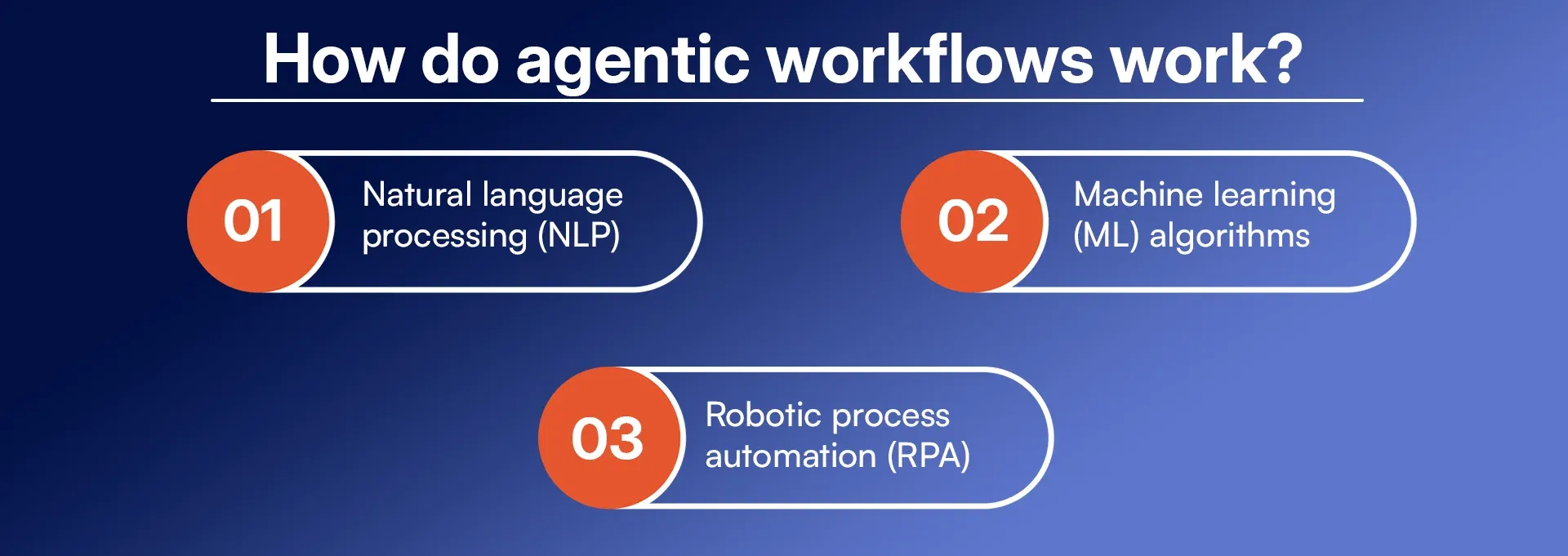 When you kick off an agentic workflow, it's like watching a well-oiled machine spring into action. The system's orchestrator (think team manager) breaks down your request into manageable chunks and assigns each piece to the right specialist. Some agents might crunch numbers, others make decisions, and others create content or interact with your business applications.
When you kick off an agentic workflow, it's like watching a well-oiled machine spring into action. The system's orchestrator (think team manager) breaks down your request into manageable chunks and assigns each piece to the right specialist. Some agents might crunch numbers, others make decisions, and others create content or interact with your business applications.
As they work, the agents pass information back and forth through their coordinator. They adjust on the fly based on what's happening and what other agents discover. Humans can jump in when needed, but these workflows mostly run on their own – like having a self-organizing team that doesn't need constant direction.
What makes a workflow agentic?
The big difference between AI agentic workflows and run-of-the-mill automation is adaptability. Regular automation is like following a cooking recipe step-by-step. Agentic workflows are more like skilled chefs who understand food. They know the goal (make a delicious meal) and can pivot when they run out of an ingredient or face unexpected challenges.
Key components of agentic workflows
Building a killer agentic workflow is like assembling an all-star sports team. You need specialized players working together seamlessly:
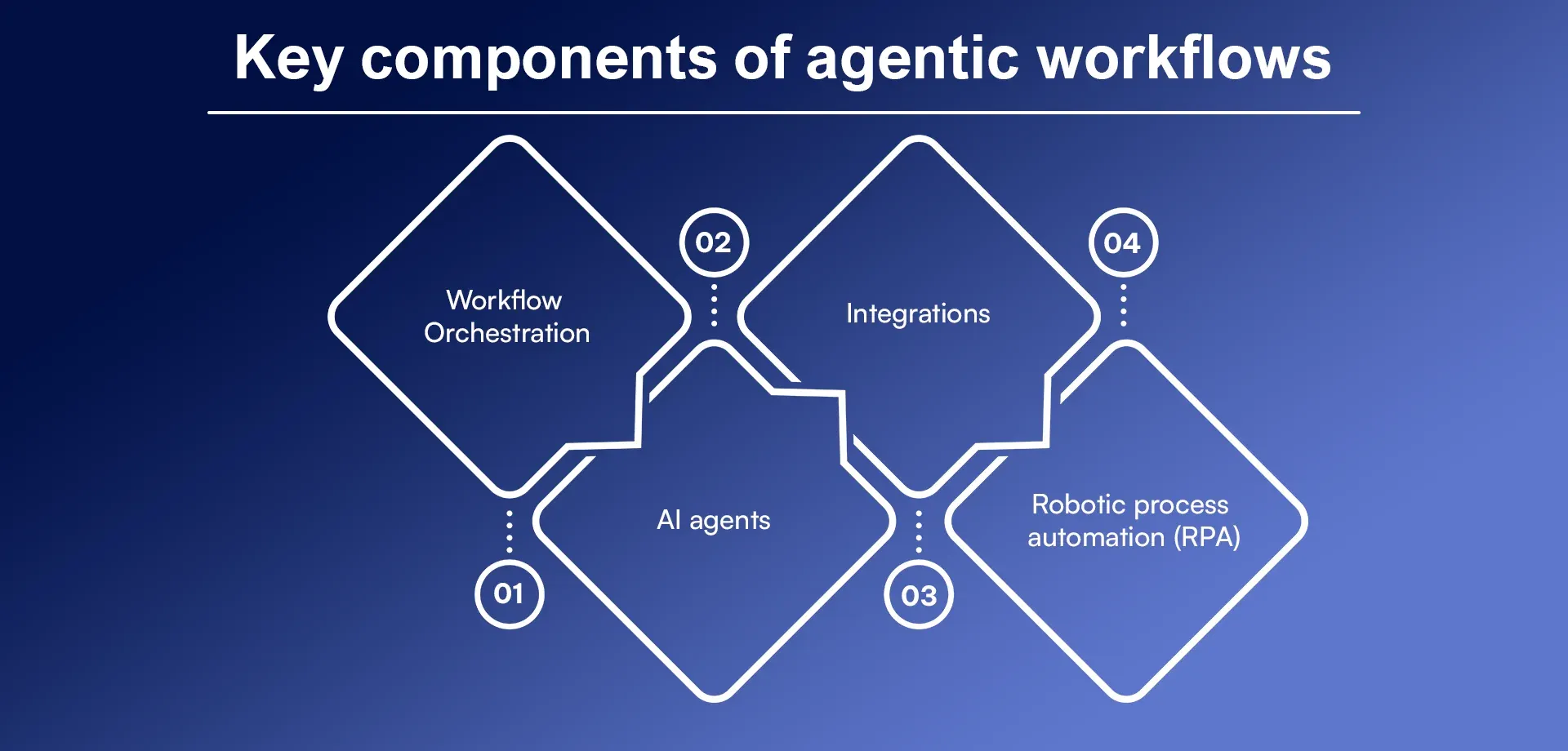
- Workflow orchestration: This is your head coach, coordinating the whole operation. It decides which agent handles what, tracks progress, and keeps everything running smoothly. The orchestrator manages the playbook, makes adjustments on the fly, and steps in when things go sideways.
- AI agents: These are your specialized players. Each brings unique skills to the team – some are analytics whizzes, others excel at writing content, and others make smart decisions. Every agent is trained for its specific role, whether that's processing invoices, answering customer questions, or spotting investment opportunities.
- Integrations: These are the bridges connecting your AI team to your business world. Integrations let your workflow tap into existing systems, databases, and services. They ensure your workflow can access the information it needs and push results where they need to go.
- Robotic process automation (RPA): These are your utility players who can work with any system, no matter how old or clunky. RPA bots interact with legacy software that doesn't have modern connections, clicking buttons and typing data just like humans would.
Also Read: Different Types of AI Agents | A Complete Guide
Benefits of agentic workflows
Agentic workflows aren't just fancy tech – they deliver real business punch. By combining AI smarts with process automation, they transform how work gets done across organizations.
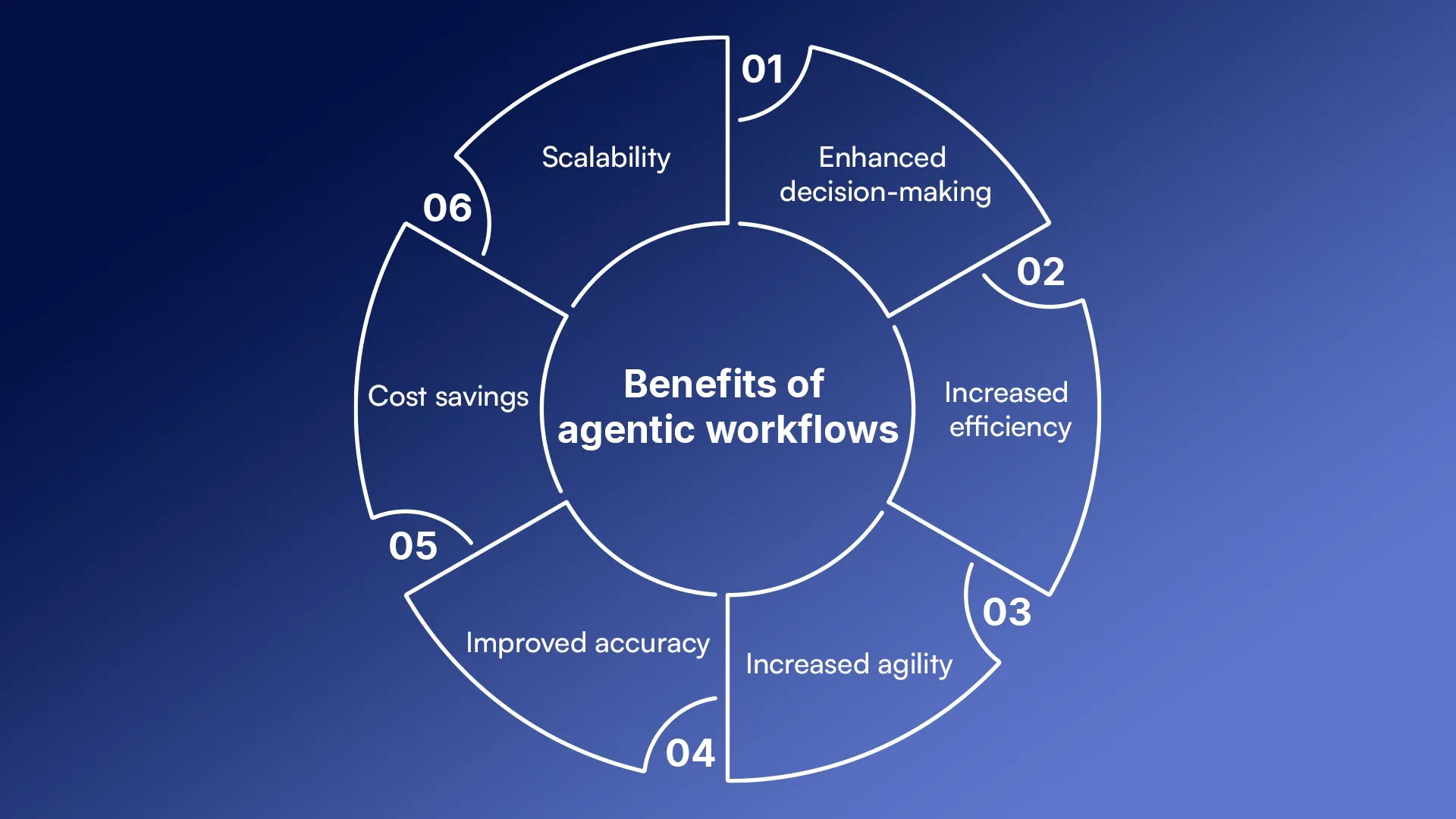
-
Enhanced decision-making: AI agents can analyze data volumes that would make humans' heads spin. They spot patterns, weigh options, and recommend the best path forward. No more gut decisions or unconscious biases – just data-driven choices backed by thorough analysis.
-
Increased efficiency: Remember that approval process that used to take days? Agentic workflows can handle it in seconds. They eliminate bottlenecks by automating end-to-end processes that once required multiple handoffs between departments and systems.
-
Increased agility: Business conditions change fast. Agentic workflows can pivot just as quickly. They adapt to new priorities, market shifts, or customer needs without requiring extensive reprogramming or process redesign.
-
Improved accuracy: Let's face it – humans make mistakes when they're tired, distracted, or inconsistently trained. AI agents don't have these problems. They perform tasks with rock-solid precision, especially important in regulated industries where errors can mean hefty fines.
-
Cost savings: By handling routine work automatically, agentic workflows slash labor costs while freeing up humans for more valuable tasks. Companies can scale operations without proportionally increasing headcount.
-
Scalability: Need to handle twice the volume during peak season? No problem. Agentic workflows scale up or down instantly without the hiring, training, and management overhead of human teams.
Use cases of Agentic AI
Agentic workflows are shaking things up across industries. Here's how different sectors are putting them to work:
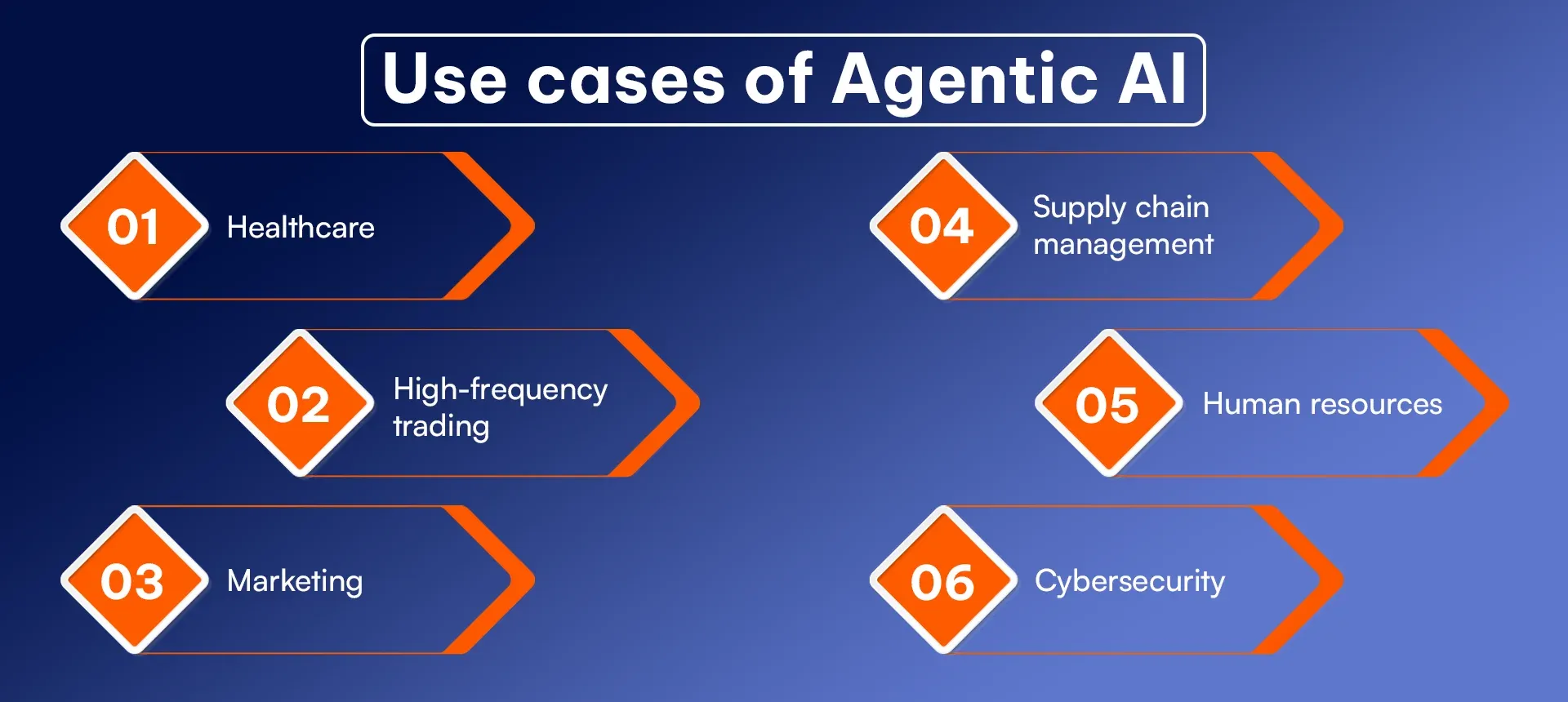
-
Healthcare: Patient care gets a boost from agentic workflows that handle paperwork, appointment scheduling, and insurance verification. AI agents monitor vital signs, flag concerning trends, and ensure patients get follow-up care. Doctors spend less time on admin work and more time healing.
-
High-frequency trading: Wall Street firms use agentic workflows to spot trading opportunities and execute transactions faster than any human trader. These systems watch markets 24/7, analyzing price movements, news, and economic indicators to make split-second decisions worth millions.
-
Marketing: Marketers leverage agentic workflows to create personalized campaigns at scale. AI agents analyze customer data, generate targeted content, and optimize campaign performance across channels. They automatically shift budgets toward what's working and away from what's not.
-
Supply chain management: Companies keep goods flowing smoothly with agentic workflows that predict demand, optimize inventory levels, and reroute shipments around disruptions. These systems monitor global events, weather patterns, and logistics data to prevent costly delays.
-
Human resources: HR teams streamline hiring with agentic workflows that screen resumes, schedule interviews, and answer candidate questions. They also help with onboarding, identify employees at risk of leaving, and ensure compliance with labor regulations.
-
Cybersecurity: Security teams stay ahead of threats using agentic workflows that monitor networks, investigate suspicious activity, and coordinate responses to attacks. These systems work around the clock, analyzing vast security data streams to catch problems before they cause damage.
Some Best practices to build agentic workflows
Creating effective agentic workflows isn't just about buying fancy tech. It requires thoughtful design and ongoing management. Follow these best practices for success:
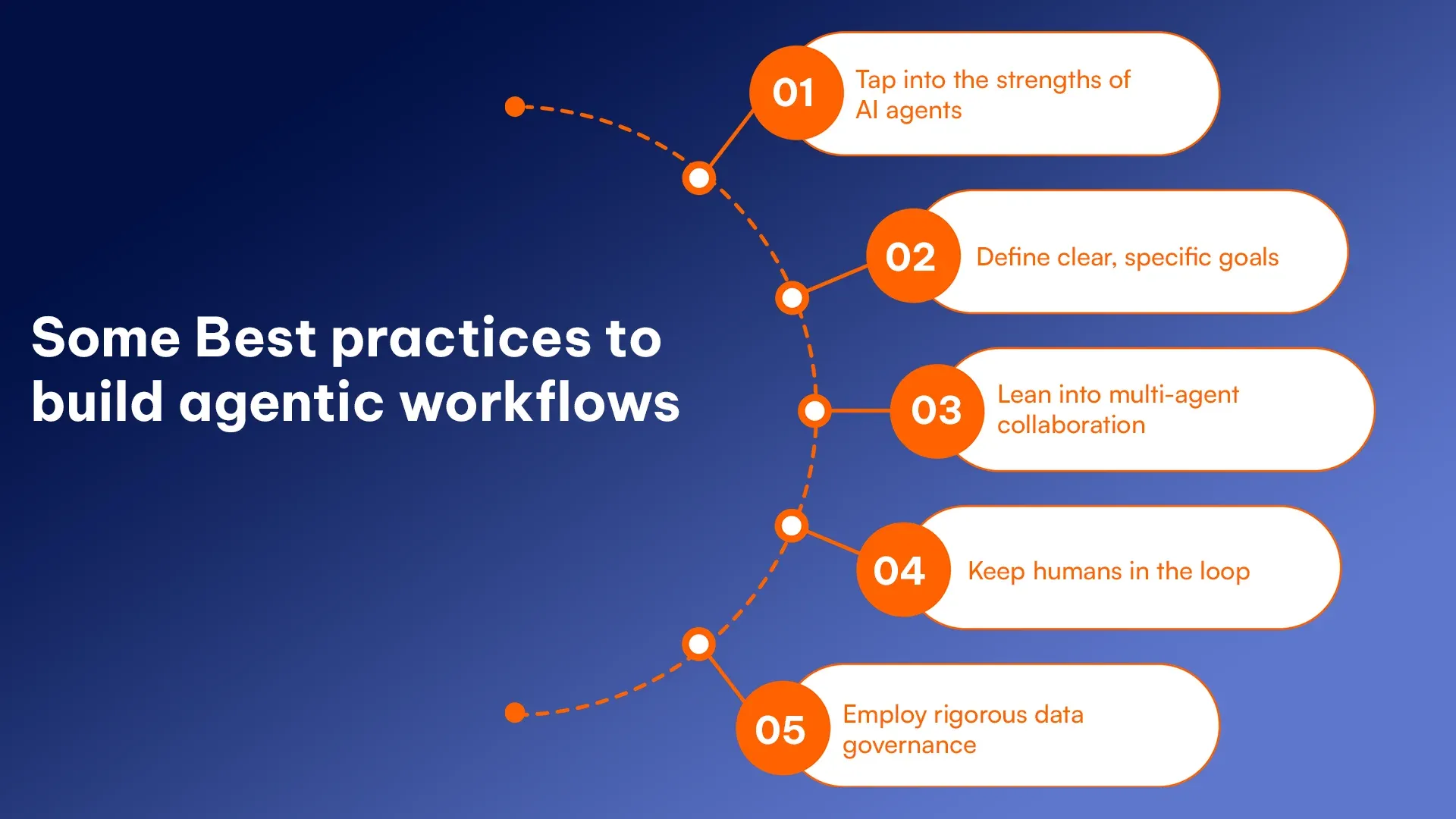
Tap into the strengths of AI agents: Don't try to make one agent do everything. Different AI models excel at different tasks. Use large language models for understanding text, specialized ML models for predictions, and traditional algorithms for rule-based decisions.
Define clear, specific goals: Know exactly what you want your workflow to accomplish. Set concrete objectives and success metrics that everyone understands. This clarity guides design decisions and creates accountability.
Lean into multi-agent collaboration: Build workflows where specialized agents work together, each handling what it does best. This approach creates more capable and resilient systems than relying on one general-purpose agent for everything.
Keep humans in the loop: Design checkpoints where humans review critical decisions, handle exceptions, and provide feedback. This hybrid approach combines AI efficiency with human judgment – especially important for high-stakes situations.
Employ rigorous data governance: Establish strong policies for data quality, security, and privacy. Ensure information used by AI agents is accurate, representative, and compliant with regulations. Monitor for potential biases or quality issues.
Conclusion
At RejoiceHub, we harness the power of agentic AI to deliver cutting-edge solutions that streamline operations, boost productivity, and drive sustainable growth for our clients. Our team works closely with organizations across industries to identify opportunities, design custom workflows, and implement solutions that deliver measurable value. As agentic AI continues to evolve, we're committed to keeping our clients at the forefront of this transformative technology.
Frequently Asked Questions
What's the difference between agentic workflows and traditional automation?
Traditional automation follows rigid rules like a robot, while agentic workflows can think for themselves, adapt to new situations, and figure out how to reach goals even when things change.
Do agentic workflows require human supervision?
They work mostly on their own, but smart implementations include human oversight for important decisions or unusual situations that fall outside the system's comfort zone.
How long does it take to implement an agentic workflow solution?
It depends on complexity – simple workflows might take weeks, while company-wide systems with lots of integrations could take months to roll out properly.
What skills are needed to develop and maintain agentic workflows?
You'll need people who understand AI/ML, process design, systems integration, and the specific business domain you're working in.
Are agentic workflows secure enough for handling sensitive data?
When properly designed with good security controls, yes. But you need to implement strong encryption, access controls, and monitoring systems.
How do you measure the ROI of agentic workflows?
Look at metrics like processing time reduction, error rate improvement, labor cost savings, increased throughput, and new revenue opportunities.
Can agentic workflows integrate with our existing systems?
Yes! Modern platforms offer extensive integration options through APIs, connectors, and RPA to work with your existing applications, no matter how old.
What types of tasks are best suited for agentic workflows?
They excel at complex processes requiring data analysis, multi-factor decision-making, coordination across systems, and adaptability to changing conditions.